
Vietnamese Americans are Americans of Vietnamese ancestry. They comprise a major part of all overseas Vietnamese. There are approximately 2.3 million people of Vietnamese descent residing in the United States as of 2023.
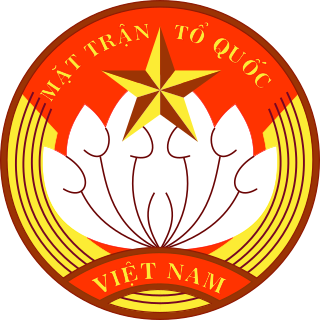
The Vietnam Fatherland Front is an umbrella group of mass movements and political coalition in Vietnam aligned with the Communist Party of Vietnam that dominates the National Assembly of Vietnam forming the Vietnamese Government and all recognized national socio-political organizations. It was founded in February 1977 by the merger of the Vietnam Fatherland Front of North Vietnam and two Viet Cong formal groups, the National Liberation Front of South Vietnam and the Alliance of National, Democratic, and Peace Forces, and is considered as the modern incarnation of the League for the Independence of Vietnam. It is an amalgamation of many smaller groups, including the Communist Party itself. Other groups that participated in the establishment of the Front were the Vietnam General Confederation of Labour, the Ho Chi Minh Communist Youth Union and the Ho Chi Minh Young Pioneer Organization. It also included the Democratic Party of Vietnam and Socialist Party of Vietnam, until they disbanded in 1988. It also incorporates some officially sanctioned religious groups, such as the Vietnam Buddhist Sangha as well as other major organizations overseeing Buddhism, Caodaism, Hòa Hảo, Islam, Christianity and their major branches such as Protestantism and SDA in the country.

The fall of Saigon was the capture of Saigon, the capital of South Vietnam, by North Vietnam and North Vietnam-controlled Viet Cong on 30 April 1975. The event marked the end of the Vietnam War and the collapse of the South Vietnamese state, leading to a transition period and the formal reunification of Vietnam into the Socialist Republic of Vietnam under communist rule on 2 July 1976.
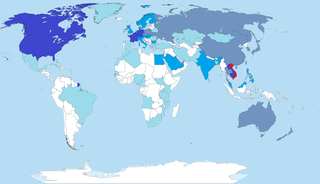
Overseas Vietnamese are Vietnamese people who live outside Vietnam. There are approximately 5 million overseas Vietnamese, the largest community of whom live in the United States.
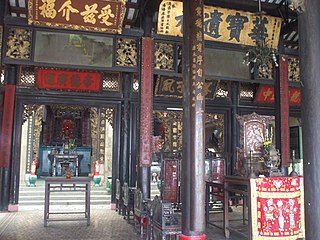
The Hoa people, also known as Vietnamese Chinese are the citizens and nationals of Vietnam of full or partial Han Chinese ancestry. Chinese migration into Vietnam dates back millennia but allusions to the contemporary Hoa today mostly refers to people of Chinese ancestry who immigrated to Vietnam during the 18th century, who especially trace their ancestry to various southern Chinese provinces. The Hoa are an ethnic minority group in Vietnam as part of the Chinese community there, and can also be found in other regions such as in the Americas. They may also be called "Chinese-Vietnamese" or "Vietnamese Chinese" by the Vietnamese.

Vietnamese Canadians are Canadian citizens of Vietnamese ancestry. As of 2021, there are 275,530 Vietnamese Canadians, most of whom reside in the provinces of Ontario, British Columbia, Alberta, and Quebec.
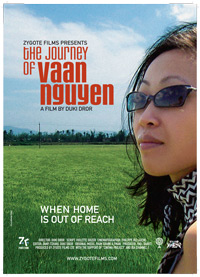
Vaan Nguyen is an Israeli poet, actress, journalist and social activist.

Vietnamese Australians are Australians of Vietnamese descent. Vietnamese Australians are one of the largest groups within the global Vietnamese diaspora.

Shmuel Moshe Tamir was a prominent Israeli independence fighter, lawyer, and Knesset member. After a successful career fighting the British, he entered the Knesset from 1965 to 1980, rising to become Minister of Justice in the government of Menachem Begin from 1977 until 1980. Tamir was an ardent anti-Nazi leading proactive legal cases to prosecute perpetrators of the Holocaust and war criminals. Tamir's maverick politics finally led him into an independent politician after several attempts of coalition with nationalist right-wing parties.
Many of the Vietnamese people in Hong Kong immigrated as a result of the Vietnam War and persecution since the mid-1970s.
The history of the Jews in Vietnam begins in the 19th century. Jews are a minor ethno-religious group in Vietnam, consisting of only about 300 people as of 2007. Although Jews have been present in Vietnam and Judaism has been practiced since the late 19th century, most adherents have been, and remain today, expatriates, with few to no native Vietnamese converts.

Israel–Vietnam relations refers to the bilateral relations between the State of Israel and the Socialist Republic of Vietnam. Vietnam and Israel established diplomatic relations on July 12, 1993, followed by Israel opening its resident embassy in Hanoi in December 1993. The current Vietnamese Ambassador to Israel is Lý Đức Trung, who has been assigned since April 2022. Ambassador Lý Đức Trung operates out of the Vietnamese embassy in Tel Aviv. The current Israeli Ambassador to Vietnam is Yaron Mayer, who has been assigned since August 2022. Ambassador Mayer operates out of the Israeli embassy in Hanoi.

Malaysia–Vietnam relations date to at least the 15th century. Malaysia forged diplomatic ties with the modern-day Vietnamese state on 30 March 1973; as of 2015, these ties are still in existence. During the late 1970s and 1980s, the countries' relationship became strained as a result of the Cambodian–Vietnamese War and the influx of Vietnamese boat people into Malaysia. The subsequent resolution of these issues saw the cultivation of strong trade and economic ties, and bilateral trade between the countries grew strongly, with an expansion into areas including information technology, education and defence. Both countries are members of APEC and ASEAN.
Vietnamese New Zealanders are New Zealanders of partially or full Vietnamese ancestry.

Vietnamese boat people were refugees who fled Vietnam by boat and ship following the end of the Vietnam War in 1975. This migration and humanitarian crisis was at its highest in the late 1970s and early 1980s, but continued well into the early 1990s. The term is also often used generically to refer to the Vietnamese people who left their country in a mass exodus between 1975 and 1995. This article uses the term "boat people" to apply only to those who fled Vietnam by sea.

UJA-Federation of New York is the largest local philanthropy in the world. Headquartered in New York City, the organization raises and allocates funds annually to fulfill a mission to “care for Jews everywhere and New Yorkers of all backgrounds, respond to crises close to home and far away, and shape our Jewish future.”

The Genesis Prize is a $1 million annual prize awarded to Jewish people who have achieved significant professional success, in recognition of their accomplishments, contributions to humanity, and commitment to Jewish values.

New Zealand–Vietnam relations refers to the relations between New Zealand and Vietnam. New Zealand has an embassy in Hanoi and a consulate-general in Ho Chi Minh City. Vietnam has an embassy in Wellington.
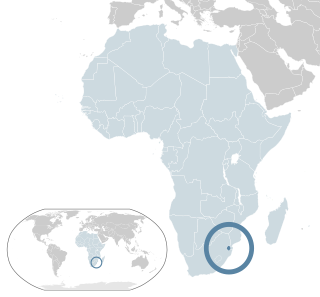
The history of the Jews of Eswatini, formerly Swaziland.
Jewish News Syndicate (JNS) is a news agency and wire service that primarily covers Jewish and Israel-related topics and news. While officially nonpartisan, compared to its larger and older competitor, the Jewish Telegraphic Agency, JNS is considered to be more conservative.


















